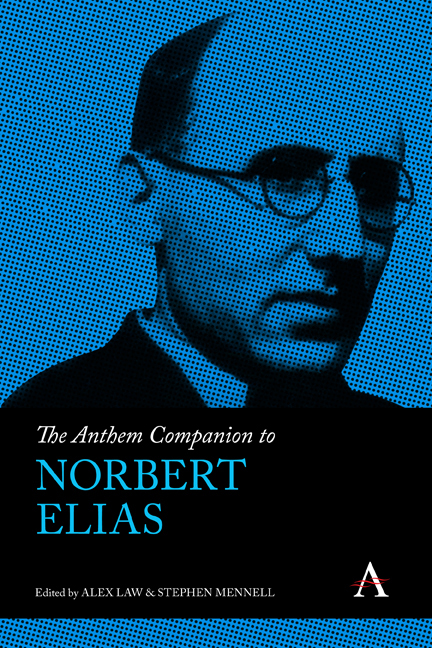Book contents
- Frontmatter
- Contents
- Notes On Contributors
- Acknowledgments
- Introduction: The Sociological Promise of Norbert Elias
- One Norbert Elias: Genesis of a Determined Thinker
- Two Knowledge, Science and Method: The Sociological Practice of Norbert Elias
- Three Norbert Elias’s Comparative Historical Sociology: Against Process Reduction
- Four Power and Process: Norbert Elias and the Paradox of Inequalities
- Five Norbert Elias and Shifting Gender Relations
- Six Travelling With Elias: Figurations and the Racialising Process in South Africa
- Seven Excitement Processes, Embodiment and Power Relations in Sport and Leisure
- Eight Warfare, Survival Units, National Habitus and Nationalism: Norbert Elias’s Contribution to Political Sociology
- Nine Elias’s Contribution to International Relations Theory: Towards a Global Sociology
- Ten Crime, Government and Civilisation: Rethinking Elias in Criminology
- Eleven Art and the Civilising Process
- Twelve From Social Mobility to Channels of Opportunity: Norbert Elias and Education
- Appendix: Published Works of Norbert Elias in English
- Index
Twelve - From Social Mobility to Channels of Opportunity: Norbert Elias and Education
Published online by Cambridge University Press: 28 February 2024
- Frontmatter
- Contents
- Notes On Contributors
- Acknowledgments
- Introduction: The Sociological Promise of Norbert Elias
- One Norbert Elias: Genesis of a Determined Thinker
- Two Knowledge, Science and Method: The Sociological Practice of Norbert Elias
- Three Norbert Elias’s Comparative Historical Sociology: Against Process Reduction
- Four Power and Process: Norbert Elias and the Paradox of Inequalities
- Five Norbert Elias and Shifting Gender Relations
- Six Travelling With Elias: Figurations and the Racialising Process in South Africa
- Seven Excitement Processes, Embodiment and Power Relations in Sport and Leisure
- Eight Warfare, Survival Units, National Habitus and Nationalism: Norbert Elias’s Contribution to Political Sociology
- Nine Elias’s Contribution to International Relations Theory: Towards a Global Sociology
- Ten Crime, Government and Civilisation: Rethinking Elias in Criminology
- Eleven Art and the Civilising Process
- Twelve From Social Mobility to Channels of Opportunity: Norbert Elias and Education
- Appendix: Published Works of Norbert Elias in English
- Index
Summary
Elias and Education
Norbert Elias seemed willing to pursue any topic within the purview of sociology, and, indeed, several academic disciplines beyond. For this reason, it is surprising that he never systematically engaged with the sociology of education, pedagogy or educational studies generally. As my recent book argued, however, Elias did provide scattered thoughts and clues as to what this analysis might look like (Lybeck 2019). Meanwhile, the field of figurational sociology of education is slowly become a thriving body of research despite the challenges of filling in considerable gaps in historical, empirical and theoretical detail. Consider this chapter as an invitation to contribute to and join this emerging conversation – this growing ‘social fund’ of knowledge.
One reason scholars are turning to Elias could be the oversaturation of Bourdieusian approaches in the field of sociology of education. Figurational approaches could secure the most valuable aspects of Bourdieu, Foucault and Abbott's sociology while avoiding some of their pitfalls (Abbott 2016; Bourdieu 1988; Foucault 2002). In the case of Bourdieu, I particularly drew on Elias's sociology of knowledge to challenge the French sociologist’s idea of a ‘cultural arbitrary’ so common in contemporary education studies. In part, these studies – often linked to the analysis of social mobility issues and educational inequalities – misrepresent Bourdieu's original position, but nonetheless, the consensus today appears to be that symbolic and cultural content taught in schools is largely the product of symbolic domination – and, hence, arbitrary. Elias not only demonstrated the genuine power and value of certain forms of knowledge – for example, in his essay on the maelstrom (where second-order knowledge of whirlpools enables one of the fishermen to escape) (Elias 2007, 105–78); he also provided a fully social ontology of knowledge such that the traditional forms of epistemology and education we are used to in ‘modern’ liberal societies become far too individualistic in contrast (Elias 2007; see Hughes and Mennell chapter two, this volume). Combining these observations with an integration of Elias's symbol theory should provide us with a novel interpretation of the social function of education as being centrally concerned with the intergenerational transfer of knowledge; knowledge being a collective, social fund, not any one individual's property.
Symbol Theory
We can begin with Elias's sociology of knowledge, which, unlike his sociology of education, was well-developed and collated by Elias himself.
- Type
- Chapter
- Information
- The Anthem Companion to Norbert Elias , pp. 231 - 242Publisher: Anthem PressPrint publication year: 2023

